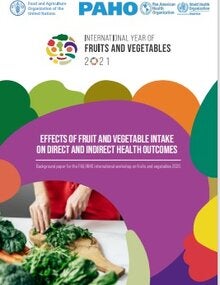OverviewThe basis for this publication was the FAO and PAHO / WHO Second International Workshop on Fruits and Vegetables, held virtually as part of the preparation for The United Nations General Assembly 2021 the International Year of Fruits and Vegetables. FAO, the Pan American Health Organization, and the World Health Organization (PAHO / WHO) held a high-level technical workshop on fruits and vegetables, between August 24 and September 9, 2020. This publication summarizes and updates the evidence produced between the first and second international workshop and provides recommendations to improve and optimize the benefits fruits and vegetables can exert on health in all its dimensions. This background paper summarizes the evidence on the effects of fruits and vegetables intakes on direct and indirect health outcomes. For direct health outcomes, we have primarily considered premature mortality and non-communicable disease occurrence. For indirect health outcomes, we have briefly considered planetary health and reducing inequities. Two existing low-risk-of-bias systematic reviews identified broad and significant benefits from fruits and vegetables intakes on premature mortality, coronary heart disease, and type 2 diabetes incidence. These direct health effects observed due to fruits and vegetables intakes are considerable, and may be due to their constituents, such as dietary fibre and micronutrients, and their low energy density and high satiety relative to other foods that may also contain added sugars, sodium, and saturated fats. Modelling and observational research studies have reported benefits to sustainability outcomes and a reduction of inequities in food systems with the production of fruits and vegetables grown within agroecological systems and distributed through short supply chains. Such systems require protection from large scale monocropping and industrial methods of food production and supply. Finally, we have considered fruit and vegetable processing and preparation methods given the considerable health consequences of changes to the food supply towards ultra-processed products. This background paper concludes with a summary of findings. |

